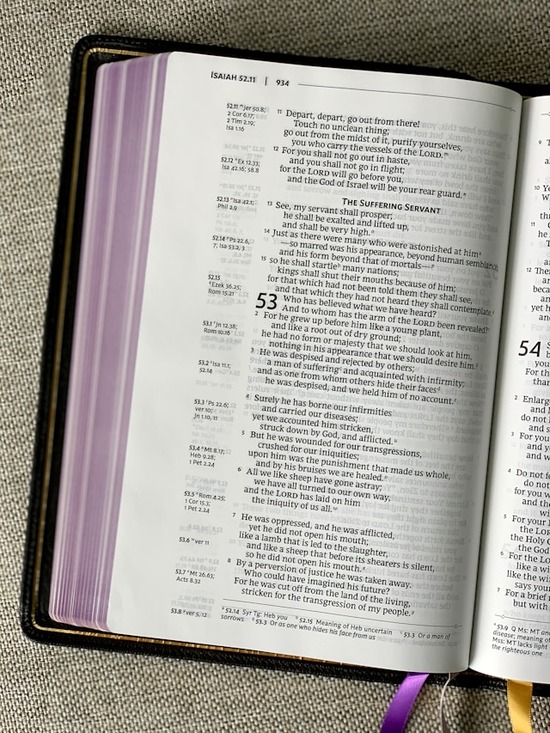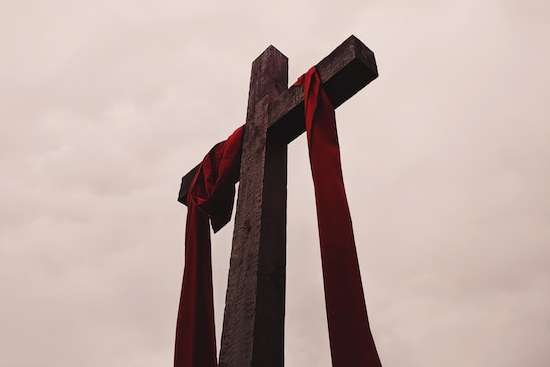An In-Depth List of the Prophecies About Jesus
How many prophecies of Jesus Christ are in the Old Testament?
According to an article by the Associates for Biblical Research, over 400!1 Some of these are “foreshadowings” of Jesus as the Messiah—stories or symbolism that pointed to Him (such as the lamb of sacrifice in the ancient Israelite sanctuary system). But many of them were prophecies about specific details that He fulfilled, many hundreds of years later.
Though we’ll by no means be able to cover 400, we’ll look at several significant prophecies from each of the following categories:
The only prophecies in this list that haven’t come true yet are the ones about Christ’s Second Coming. But the fact that all the others have been fulfilled gives us confidence in the remainder.
Let’s find out more.
Prophecies about Jesus’ birth

Photo by Greyson Joralemon on Unsplash
We’ll start off with prophecies related to Jesus’ cal
ling, birth, and lineage. Even while still a baby, He fulfilled numerous prophecies about the Messiah.
Called from the womb
“The Lord called Me from the womb, from the body of My mother He named My name” (Isaiah 49:1, ESV).
Before and during Mary’s pregnancy, Jesus already had a calling to be the Savior of His people. We see this in what the angel Gabriel told Mary (Luke 2:31-33) and, later, Joseph:
“[Mary] will bear a son, and you shall call His name Jesus, for He will save His people from their sins” (Matthew 1:21, ESV).
Born to a virgin
“Therefore the Lord himself will give you a sign. Behold, the virgin shall conceive and bear a son, and shall call His name Immanuel” (Isaiah 7:14, ESV).
Indeed, Jesus was born to Mary while she was still a virgin. The angel Gabriel appeared to Mary, who was not yet married at the time (Luke 1:26-27), and announced that she would be the mother of the Messiah through the Holy Spirit (vs. 31).
Astonished, Mary asked:
“How will this be, since I am a virgin?” (Luke 1:34, ESV)
The angel assured her:
“The Holy Spirit will come upon you, and the power of the Most High will overshadow you; therefore the child to be born will be called holy—the Son of God” (Luke 1:35, ESV).
Descended from Abraham, Isaac, and Jacob
“In you all the families of the earth shall be blessed” (Genesis 12:3, ESV).
Numerous prophecies in the Old Testament foretold that Jesus would descend from Abraham, Isaac, and Jacob. The first of these prophecies is this promise God made to Abraham that, through him, all the families of the earth would be blessed—specifically because the Messiah would be born from his family.
God repeated this promise to:
- Abraham, in Genesis 19:19; 28:14
- Isaac, in Genesis 17:19; 22:18; 26:4
- Jacob, in Genesis 28:14
Jesus’ lineage does in fact trace back to these three individuals (Luke 3:34).
From the tribe of Judah
“The scepter shall not depart from Judah, nor a lawgiver from between his feet, until Shiloh comes, and to Him shall be the obedience of the people” (Genesis 49:10, NKJV).
A scepter is a symbol of ruling authority.2 This prophecy, then, said that ruling authority would remain in the tribe of Judah until the time of the Messiah—called “Shiloh” here.
Luke 3:33, part of the genealogy of Jesus, attests that He came from the tribe of Judah.
From the line of David
“For unto us a Child is born, unto us a Son is given; and the government will be upon His shoulder. And His name will be called Wonderful, Counselor, Mighty God, Everlasting Father, Prince of Peace. Of the increase of His government and peace there will be no end, upon the throne of David and over His kingdom, to order it and establish it with judgment and justice from that time forward, even forever” (Isaiah 9:6-7, NKJV).
“There shall come forth a Rod from the stem of Jesse, and a Branch shall grow out of his roots” (Isaiah 11:1, NKJV).
These two prophecies foretold that the Messiah would continue the royal line of David and come from Jesse (David’s father).
Some other passages speak of David’s throne being established forever (through the coming Messiah that would reign upon it):
- 2 Samuel 7:12-13
- 1 Chronicles 17:14
- Psalm 89:35-37
Jeremiah 23:5-6 (also Jeremiah 33:14-16) is even more specific:
“‘Behold, the days are coming,’ says the Lord, ‘that I will raise to David a Branch of righteousness; a King shall reign and prosper, and execute judgment and righteousness in the earth. In His days Judah will be saved, and Israel will dwell safely; now this is His name by which He will be called: THE LORD OUR RIGHTEOUSNESS’” (NKJV).
The beginning of Jesus’ genealogy in Matthew 1:1 tells us right away that He was the “Son of David,” meaning He was a descendant of David. Paul reiterates this in Acts 13:22-23.
Born in Bethlehem
“But you, Bethlehem Ephrathah, though you are little among the thousands of Judah, yet out of you shall come forth to Me the One to be Ruler in Israel, whose goings forth are from of old, from everlasting” (Micah 5:2, NKJV).
Around the time that Mary was ready to give birth, the Roman emperor required all the residents of the empire to return to the towns of their lineage for a census. This meant that Joseph, together with Mary, traveled from their hometown of Nazareth to Bethlehem, where Jesus was born (Luke 2:4-7). What timing!
Prophecies about Jesus’ roles

Photo by Rodolfo Clix
The following Old Testament prophecies cover different titles and roles of the Messiah. We look at how Christ lived these out during His time on earth and continues to do so in heaven.
Savior
“Say to those who are fearful-hearted, ‘Be strong, do not fear! Behold, your God will come with vengeance, with the recompense of God; He will come and save you’” (Isaiah 35:4, NKJV).
Jesus came to save His people from their sins. This is the mission the angel Gabriel prophesied to Mary (Matthew 1:21) and the mission that Jesus Himself claimed (Luke 19:10).
Immanuel, “God with us”
“Behold, the virgin shall conceive and bear a son, and shall call His name Immanuel” (Isaiah 7:14, ESV).
Matthew 1:23 references this prophecy and points out its fulfillment with Jesus’ birth to Mary as a virgin. He was indeed “God with us”—the Word that was God, as the disciple John put it (John 1:1-3, 14).
Son of God
“I will declare the decree: The Lord has said to Me, ‘You are My Son, today I have begotten You. Ask of Me, and I will give You the nations for Your inheritance, and the ends of the earth for Your possession’” (Psalm 2:7, NKJV).
In this Messianic prophecy, the Lord speaks to the Messiah, calling Him His Son.
At His baptism, God the Father called Jesus His “beloved Son,” and many others—even demons—acknowledged Him as the “Son of God” (Matthew 8:29; John 6:69).
Son of Man
“Let Your hand be upon the man of Your right hand, upon the son of man whom You made strong for Yourself” (Psalm 80:17, NKJV).
This psalm, which was written during a time of national distress in Israel, gave the people hope of a coming Messiah whom they could trust.3 Here, the Messiah is called the “man of [God’s] right hand” and the “son of man.”
These are descriptions of Jesus we find numerous times in the Gospel accounts, particularly Mark 14:62:
“You will see the Son of Man sitting at the right hand of the Power, and coming with the clouds of heaven” (NKJV).
King

Photo by Markus Spiske on Unsplash
Many of the prophecies we’ve already looked at affirm Christ’s royal lineage and place on David’s throne (Isaiah 9:6-7).
When Jesus was born, Herod was afraid of the potential threat to the throne because he heard Jesus would be a king (Matthew 2:2-3). And when Jesus died on the Cross, the sign above His head called him “the King of the Jews” (Mark 15:26).
He will fulfill this role more fully when He comes again the second time to receive His kingdom (Daniel 7:13-14).
Shepherd
“He will feed His flock like a shepherd; He will gather the lambs with His arm, and carry them in His bosom, and gently lead those who are with young” (Isaiah 40:11, NKJV).
In addition to this prophecy in Isaiah 40:11, Ezekiel repeatedly prophesied that God would establish a Shepherd over His people (Ezekiel 34:23-24; 37:24-28).
Jesus fulfilled this role in His compassion for the people and His efforts to guide and teach them (Matthew 9:36; John 10:10-18).
Intercessor between man and God
“He saw that there was no man, and wondered that there was no intercessor; therefore His own arm brought salvation for Him; and His own righteousness, it sustained Him” (Isaiah 59:16, NKJV).
This prophecy in Isaiah looked forward to how the Messiah would be an intercessor—or mediator—between God and man. He wasn’t a mediator in the sense that God needed to be appeased. Instead, He did it out of His love for His people and desire to save them from sin.
This was an aspect of Christ’s role that He Himself acknowledged in His words, “Therefore whoever confesses Me before men, him I will also confess before My Father who is in heaven” (Matthew 10:32, NKJV).
The apostle Paul also mentions it later in the New Testament (1 Timothy 2:5; Hebrews 7:25).
Prophet
“The Lord your God will raise up for you a Prophet like me from your midst, from your brethren. Him you shall hear” (Deuteronomy 18:15, NKJV).
This was one of the earlier Messianic prophecies spoken by Moses, foretelling a “Prophet” that God would send to His people.
Of course, this prophecy doesn’t mean Jesus was only a prophet—He was definitely one with God—but it foretold one of His roles.
Some people who witnessed His feeding of the 5,000 exclaimed, referencing the prophecy from Deuteronomy: “This is truly the Prophet who is to come into the world” (John 6:14, NKJV).
Jesus Himself prophesied what would happen in the future, such as:
- Judas’ betrayal (Mark 10:33)
- Peter’s denial (Luke 22:31-34)
- The destruction of Jerusalem (Luke 21:2-24)
- The signs of His coming (Matthew 24)
Prophecies about Jesus’ ministry

Photo by Tim Wildsmith on Unsplash
Jesus’ ministry on earth covers the three and a half years that He spent teaching, healing, and preaching the Gospel, leading up to His death on the Cross.
The prophecies of this time reflect the healing mission that was given to Him by the Holy Spirit and the way He fulfilled that mission. Some of these prophecies also foretold how His messages would be received.
Let’s take a closer look.
Called out of Egypt
“When Israel was a child, I loved him, and out of Egypt I called My son” (Hosea 11:1, NKJV).
This prophecy has a dual application, applying first to the people of ancient Israel and God calling them out of Egypt but also applying to Jesus.
Soon after His birth, an angel in a dream warned Joseph and Mary that Herod would seek to murder Jesus, so they took Jesus and fled to Egypt. They stayed there until the death of Herod (Matthew 2:13-15).
Preceded by a messenger
“‘Behold, I send My messenger, and he will prepare the way before Me. And the Lord, whom you seek will suddenly come to His temple, even the Messenger of the covenant, in whom you delight. Behold, He is coming,’ says the Lord of hosts” (Malachi 3:1, NKJV).
“The voice of one crying in the wilderness: ‘Prepare the way of the Lord; make straight in the desert a highway for our God’” (Isaiah 40:3, NKJV).
Both of these prophecies foretold a messenger that would come before Christ. They came true in the person of John the Baptist.
Even before his conception, John the Baptist had a special mission. An angel came to his father Zacharias and announced that his son would “make ready a people prepared for the Lord” (Luke 1:17, NKJV).
Other passages in the New Testament also recognize John the Baptist as the messenger who prepared the way for Jesus (Matthew 11:10-15; John 1:23).
Anointed by the Holy Spirit
“The Spirit of the LORD shall rest upon Him, the Spirit of wisdom and understanding, the Spirit of counsel and might, the Spirit of knowledge and of the fear of the LORD” (Isaiah 11:2, NKJV).
“The Spirit of the Lord GOD is upon Me, because the LORD has anointed Me to preach good tidings to the poor; He has sent Me to heal the brokenhearted, to proclaim liberty to the captives, and the opening of the prison to those who are bound” (Isaiah 61:1, NKJV).
Anointing in the Bible is often equated with receiving the Holy Spirit (Acts 10:38). This connects to other prophecies that speak of the coming Messiah as “the Anointed One” (1 Samuel 2:10; Psalm 2:2; 45:7-8).
Jesus’ anointing took place at His baptism when the Holy Spirit descended upon Him like a dove (Matthew 3:16).
Began His ministry in Galilee

Photo by Sylvain Brison on Unsplash
“By the way of the sea, beyond the Jordan in Galilee of the Gentiles. The people who walked in darkness have seen a great light; those who dwelt in the land of the shadow of death, upon them a light has shined” (Isaiah 9:1-2, NKJV).
Just as this verse in Isaiah foretold light shining upon people in Galilee, Christ began His ministry there.
Matthew 4:12-13 records:
“[Jesus] departed to Galilee. And leaving Nazareth, He came and dwelt in Capernaum, which is by the sea, in the regions of Zebulun and Naphtali” (NKJV).
The writer of Matthew then went on to mention the prophecy in Isaiah 9, showing how it came true.
Did the will of the Father
“The pleasure of the Lord shall prosper in His hand” (Isaiah 53:10, NKJV).
“Then I said, ‘Behold, I come; in the scroll of the book it is written of me. I delight to do Your will, O my God, and Your law is within my heart’” (Psalm 40:7-8, NKJV).
These passages point out the way the Messiah would do the will of the Father. Zechariah 3:8 also speaks of the Messiah being the “Servant” of God.
Jesus’ life was focused on serving His Father and doing His will (John 4:34), and even in Gethsemane when faced with the agonizing decision of whether to go forward with His death on the Cross, He prayed, “Not as I will, but as You will” (Matthew 26:39, ESV).
Spoke and brought grace
“You are fairer than the sons of men; grace is poured upon Your lips; therefore God has blessed You forever” (Psalm 45:2, NKJV).
Christ’s life was full of grace to those in need. He didn’t shy away from those who were different or struggling (Luke 15:1-2). Instead, He welcomed them and spent time with them, helping them to see their potential.
He lived out grace and spoke words of grace (John 1:17). So much so that “all spoke well of Him and marveled at the gracious words that were coming from His mouth” (Luke 4:22, ESV).
Healing ministry
“I, the Lord, have called You in righteousness, and will hold Your hand; I will keep You and give You as a covenant to the people, as a light to the Gentiles, to open blind eyes, to bring out prisoners from the prison, those who sit in darkness from the prison house” (Isaiah 42:6-7, NKJV).
“The Spirit of the Lord God is upon Me, because the Lord has anointed Me to preach good tidings to the poor; He has sent Me to heal the brokenhearted, to proclaim liberty to the captives, and the opening of the prison to those who are bound” (Isaiah 61:1, NKJV).
These prophecies looked forward to the ministry of the Messiah and were clearly reflected in what Jesus did while on earth.
Healing was an important aspect of His ministry (Matthew 4:23). In many instances throughout Scripture, Jesus healed people both physically and spiritually. Many people came to Him with illnesses or paralysis, and He would also meet their deeper need for peace and forgiveness of sin (Matthew 9:2; Luke 7:50).
And when John the Baptist was in prison and sent messengers to Jesus to ask whether He was the Promised One, Jesus’ response was:
“Go and tell John the things which you hear and see: The blind see and the lame walk; the lepers are cleansed and the deaf hear; the dead are raised up and the poor have the gospel preached to them” (Matthew 11:4-5, NKJV).
Ministry to both Jews and Gentiles
“Indeed He says, ‘It is too small a thing that You should be My Servant to raise up the tribes of Jacob, and to restore the preserved ones of Israel; I will also give You as a light to the Gentiles, that You should be My salvation to the ends of the earth’” (Isaiah 49:6, NKJV).
This prophecy highlights how the Messiah would reach out to both Jews and Gentiles (non-Jews). Here are a few more prophecies that show who the Messiah’s ministry would be for:
- The Jews: Isaiah 59:20
- The Gentiles: Isaiah 9:1-2; 11:10; 42:1-4
- Both: Isaiah 60:1-3
Christ truly did minister to all people, regardless of their class, nationality, or currently-held beliefs. He spent time with the religious leaders and the outcasts of society (John 3; Luke 7:36; 15:1-2). He helped a Roman soldier and a Samaritan (Matthew 8:5-7; John 4). He longed to give the truth to all and instructed His disciples to do the same by going into all the world (Matthew 28:19-20).
Misunderstood by people
“He will be as a sanctuary, but a stone of stumbling and a rock of offense to both the houses of Israel, as a trap and a snare to the inhabitants of Jerusalem” (Isaiah 8:14, NKJV).
Jesus brought hope and healing, and He never intended for people to misunderstand Him. But many of His own people were so filled with their own expectations of who the Messiah would be (a conquering king) that they struggled to accept Jesus as a humble teacher. In this sense, then, what He offered to them as a step in the right direction instead became a “stone of stumbling” for them. Jesus’ ministry was something different than what they wanted, and they were not willing to surrender their mindsets.
A passage in Isaiah 6:9-10, which Jesus quoted, explains this further:
“Therefore I speak to them in parables, because seeing they do not see, and hearing they do not hear, nor do they understand. And in them the prophecy of Isaiah is fulfilled, which says: ‘Hearing you will hear and shall not understand, and seeing you will see and not perceive; for the hearts of this people have grown dull’” (Matthew 13:14-15, NKJV).
Opposed by those in power
“Why do the nations rage, and the people plot a vain thing? The kings of the earth set themselves, and the rulers take counsel together against the Lord and against His Anointed” (Psalm 2:1-2, NKJV).
Many of the religious leaders opposed Jesus’ ministry and plotted to arrest and destroy Him (Matthew 12:14; Mark 3:6; John 11:53). When they finally achieved their goal of having Him arrested, Jesus was brought to trial before the high priest Caiaphas (Matthew 26:57), King Herod (Luke 23:11), and the Roman governor Pilate (Matthew 27:2).
Looking back at these events, the apostle Peter commented on this prophecy in Psalms:
“For truly against Your holy Servant Jesus, whom You anointed, both Herod and Pontius Pilate, with the Gentiles and the people of Israel, were gathered together to do whatever Your hand and Your purpose determined before to be done” (Acts 4:27-28, NKJV).
Rejected by His people and a man of sorrows
“He is despised and rejected by men, a Man of sorrows and acquainted with grief. And we hid, as it were, our faces from Him; He was despised, and we did not esteem Him” (Isaiah 53:3, NKJV).
“The stone which the builders rejected has become the chief cornerstone. This was the Lord’s doing; it is marvelous in our eyes” (Psalm 118:22-23, NKJV).
After beginning His ministry, Jesus went to Nazareth, His hometown, but His own people rejected Him and attempted to stone Him (Luke 4:16-29). And ultimately, an even greater crowd rejected Him and cried out for Him to be crucified (Mark 15:9-15).
No doubt, Christ carried a heavy burden for His people and longed for them to accept Him. Toward the end of His ministry, He looked out over Jerusalem and wept:
“O Jerusalem, Jerusalem, the one who kills the prophets and stones those who are sent to her! How often I wanted to gather your children together, as a hen gathers her chicks under her wings, but you were not willing!” (Matthew 23:37)
Even so, despite being rejected by His own, He became the cornerstone of the Christian faith (Matthew 21:42-43; Acts 4:11-12).
Prophecies about Jesus’ death and resurrection

Photo by Alicia Quan on Unsplash
Christ’s main mission on earth was to save us from our sins (Matthew 1:21). This would involve taking the penalty of sin—death and separation from the Father—so that we wouldn’t have to.
A time prophecy in Daniel 9 foretold that the Messiah would come “to finish the transgression, to make an end of sins, to make reconciliation for iniquity, to bring in everlasting righteousness” (Daniel 9:24, NKJV).
To do so, the “Messiah shall be cut off, but not for Himself” (Daniel 9:26, NKJV).
Large passages of Scripture foretold what that would be like. Isaiah 53 details the experience of the Suffering Servant and how He would be wounded for us. And both Psalm 22 and Psalm 102:1-11 portray the agony of His death.
Many more prophecies pinpoint specific details of Jesus’ suffering, death, and resurrection. We’ll turn to those now.
Plotted against
“For I hear the slander of many; fear is on every side; while they take counsel together against me, they scheme to take away my life” (Psalm 31:13, NKJV).
Though Jesus had lived a life of service to others, showing compassion and healing people, not everyone appreciated His ministry. As we looked at in the previous section, many religious leaders and people in power opposed Jesus because they saw His teachings as a threat.
Passages like Matthew 27:1 record the way religious and political leaders plotted to take Jesus’ life:
“When morning came, all the chief priests and elders of the people plotted against Jesus to put Him to death” (NKJV).
Betrayed by someone close to Him
“Even my own familiar friend in whom I trusted, who ate my bread, has lifted up his heel against me” (Psalm 41:9, NKJV).
This verse well foretold the betrayal that Christ would face from His disciple Judas—the one He’d poured into for three and a half years (Matthew 27:6-10; Luke 22:3-5). Jesus even cites this verse from the Psalms (John 13:18).
Forsaken by His disciples
“‘Awake, O sword, against My Shepherd against the Man who is My Companion,’ says the Lord of hosts. ‘Strike the Shepherd, and the sheep will be scattered; then I will turn My hand against the little ones’” (Zechariah 13:7, NKJV).
“I am a reproach among all my enemies, but especially among my neighbors, and am repulsive to my acquaintances; those who see me outside flee from me” (Psalm 31:11, NKJV).
Though Psalm 31 is spoken by David in the first person, many of its descriptions more accurately foreshadow the coming Messiah and His sufferings. In fact, Jesus quoted directly from the Psalms when on the Cross (more on that later).
Both of these prophecies foretold Jesus’ arrest when His disciples forsook Him and fled the scene (Mark 14:50).
Beaten
“I gave My back to those who struck Me, and My cheeks to those who plucked out the beard; I did not hide My face from shame and spitting” (Isaiah 50:6, NKJV).
“Just as many were appalled at you—his appearance was so disfigured that he did not look like a man, and his form did not resemble a human being” (Isaiah 52:14, CSB).
Throughout His trials up to His crucifixion, Jesus was cruelly mistreated by those who had custody over Him (Matthew 26:67-68; 27:27-31; Luke 22:63).
He Himself also knew that these things would happen to Him. He even told His disciples:
“See, we are going up to Jerusalem. Everything that is written through the prophets about the Son of Man will be accomplished. For He will be handed over to the Gentiles, and He will be mocked, insulted, spit on; and after they flog Him, they will kill Him, and He will rise on the third day” (Luke 18:31-33, CSB).
Silent before his accusers
“Those who intend to kill me set traps, and those who want to harm me threaten to destroy me; they plot treachery all day long. I am like a deaf person; I do not hear. I am like a speechless person who does not open his mouth” (Psalm 38:12-13, CSB).
“He was oppressed and He was afflicted, yet He opened not His mouth; He was led as a lamb to the slaughter, and as a sheep before its shearers is silent, so He opened not His mouth” (Isaiah 53:7, NKJV).
Though false witnesses came forward and accused Christ of wrongdoing, He chose to remain silent and not defend Himself during His trials. This behavior was so unusual that the Roman governor Pilate exclaimed, “Do You not hear how many things they testify against You?” (Matthew 27:13, NKJV)
And yet, Jesus remained silent even then (verse 14).
Stripped of His clothing
“They divide My garments among them, and for My clothing they cast lots” (Psalm 22:18, NKJV).
Before crucifying Jesus, Roman soldiers stripped Him of His clothing and divided it among themselves.
But one garment—Jesus’ tunic—was made from a single piece of cloth and couldn’t be divided, so instead, the soldiers cast lots for it (John 19:23-24)—similar to how we might throw dice for something today.
Pierced in His hands and feet
“They pierced My hands and My feet” (Psalm 22:16, NKJV).
“Then they will look on Me whom they pierced” (Zechariah 12:10, NKJV).
The process of crucifixion involves piercing the hands and/or the feet of the victim through with nails. Jesus experienced this (Mark 15:25). In addition, soldiers pierced His side with a sword after He had died (John 19:34).
Hung on a tree

Photo by Ismael Paramo on Unsplash
“If a man has committed a sin deserving of death, and he is put to death, and you hang him on a tree, his body shall not remain overnight on the tree, but you shall surely bury him that day, so that you do not defile the land which the Lord your God is giving you as an inheritance; for he who is hanged is accursed of God” (Deuteronomy 21:22-23, NKJV).
This passage isn’t specifically talking about the Messiah, but it does describe what He did for us by being crucified on a wooden cross—a tree (Acts 5:30).
What’s more, the apostle Paul specifically refers back to this passage from Deuteronomy and shows how Jesus fulfilled it:
“Christ has redeemed us from the curse of the law, having become a curse for us (for it is written, ‘Cursed is everyone who hangs on a tree’)” (Galatians 3:13, NKJV).
Thirsty and given vinegar to drink
“My strength is dried up like baked clay; my tongue sticks to the roof of my mouth. You put me into the dust of death” (Psalm 22:15, CSB).
“Instead, they gave me gall for my food, and for my thirst they gave me vinegar to drink” (Psalm 69:21, CSB).
John 19:28 records how Jesus, while on the Cross, said, “I’m thirsty” (CSB). But rather than giving Him water to drink, the soldiers gave Him “sour wine mingled with gall to drink” (Matthew 27:34, NKJV).
Mocked
“All those who see Me ridicule Me; they shoot out the lip, they shake the head, saying, ‘He trusted in the Lord, let Him rescue Him; let Him deliver Him, since He delights in Him!’” (Psalm 22:7-8, NKJV)
As Christ hung on the Cross, the religious leaders who were present taunted Him:
“He saved others; Himself He cannot save. If He is the King of Israel, let Him now come down from the cross, and we will believe Him. He trusted in God; let Him deliver Him now if He will have Him; for He said, ‘I am the Son of God’” (Matthew 27:42-43, NKJV).
Even the two men crucified next to Jesus joined in and mocked Him (verse 44).
Bore our sins
“But He was wounded for our transgressions, He was bruised for our iniquities; the chastisement for our peace was upon Him, and by His stripes we are healed. … And He was numbered with the transgressors, and He bore the sin of many” (Isaiah 53:5, 12, NKJV).
In Matthew 1:21, the angel Gabriel said that Jesus’ mission was to save us from our sins. Jesus fulfilled this mission by bearing our sins and their penalty of death.
In the Old Testament, the ancient Israelites sacrificed a lamb to represent forgiveness of sins. But the lamb they sacrificed was just a symbol. It foreshadowed what Christ would come and do as “the Lamb of God who takes away the sin of the world” (John 1:29; Isaiah 53:7). He took our sins for us (Hebrews 9:28; 1 Peter 2:24). Paul wrote,
“For He made Him who knew no sin to be sin for us, that we might become the righteousness of God in Him” (2 Corinthians 5:21, NKJV).
The weight of sin was the agonizing weight Jesus bore from Gethsemane—where He sweated drops of blood (Luke 22:44)—all the way to the Cross.
Cried out in agony
“My God, My God, why have You forsaken Me? Why are You so far from helping Me, and from the words of My groaning?” (Psalm 22:1, NKJV)
In addition to this verse, Psalm 88 also describes the agony the Messiah would experience.
Out of His deepest suffering as He bore the consequences of sin—separation from the Father—Jesus cried out, “My God, My God, why have You forsaken Me?” (Matthew 27:46, NKJV).
None of his bones broken
“He guards all his bones; not one of them is broken” (Psalm 34:20, NKJV).
Back in ancient Israel, one of the stipulations for the Passover lamb was that none of its bones could be broken (Exodus 12:46). Jesus’ death fulfilled this symbol—and the prophecy in Psalms—in that none of His bones were broken either.
It was common for the Roman soldiers to break the legs of victims on a cross to make them die more quickly. But when the Roman soldiers came to Jesus, they saw that He had already died and didn’t do so (John 19:31-36).
Blood and water poured out
“I am poured out like water, and all My bones are out of joint; my heart is like wax; it has melted within Me” (Psalm 22:14).
Rather than breaking Jesus’ legs, the Roman soldiers pierced His side with a sword. When they did so, blood and water ran out of His side (John 19:34).
Conquered death and the devil
“And I will put enmity between you and the woman, and between your seed and her Seed; He shall bruise your head, and you shall bruise His heel” (Genesis 3:15, NKJV).
Genesis 3:15 is the first ever Messianic prophecy in the Bible. God spoke it to the serpent after it had deceived Adam and Eve, telling the serpent that the Seed—offspring—of the woman would come and bruise its head, ultimately conquering it.
Jesus indeed conquered the serpent—the devil—when He cried out, “It is finished!” on the Cross (John 19:30). He died, but death could not keep Him. He conquered the devil and death by rising from the grave (Hebrews 2:14).
The apostle John, looking back, wrote:
“For this purpose the Son of God was manifested, that He might destroy the works of the devil” (1 John 3:8, NKJV).
Rose from the dead

Photo by Pisit Heng on Unsplash
“Therefore my heart is glad, and my glory rejoices; my flesh also will rest in hope. For You will not leave my soul in Sheol, nor will You allow Your Holy One to see corruption” (Psalm 16:9-10, NKJV).
“When You make His soul an offering for sin, He shall see His seed, He shall prolong His days” (Isaiah 53:10, NKJV).
The first of these prophecies points out that Jesus’ body didn’t remain in Sheol, the grave, or have time to corrupt or decay. On the third day, Jesus rose from the tomb—just as the Scriptures had promised (Luke 24:5-7; John 20:9).
Peter, when preaching the Gospel after Jesus returned to heaven, referred to Psalm 16 and showed how He had fulfilled it:
“Brothers and sisters, I can confidently speak to you about the patriarch David: He is both dead and buried, and his tomb is with us to this day. Since he was a prophet, he knew that God had sworn an oath to him to seat one of his descendants on his throne. Seeing what was to come, he spoke concerning the resurrection of the Messiah: He was not abandoned in Hades, and his flesh did not experience decay” (Acts 2:29-31, CSB).
Ascended into heaven and poured out the Holy Spirit
“The Lord said to my Lord, ‘Sit at My right hand, till I make Your enemies Your footstool”‘”(Psalm 110:1, NKJV).
“Behold, My Servant shall deal prudently; He shall be exalted and extolled and be very high” (Isaiah 52:13, NKJV).
After His resurrection, Jesus fulfilled these prophecies by ascending to the right hand of God in heaven and pouring out His Holy Spirit on His followers (Acts 1:8-11).
To explain the outpouring of the Holy Spirit on the Day of Pentecost, Peter quoted the prophecy from Psalm 110:
“Therefore being exalted to the right hand of God, and having received from the Father the promise of the Holy Spirit, He poured out this which you now see and hear. For David did not ascend into the heavens, but he says himself: ‘The Lord said to my Lord, “Sit at My right hand, till I make Your enemies Your footstool”’”’ (Acts 2:33-35, NKJV).
Even today, Christ is in heaven, promising to return for us. Let’s look at those prophecies next.
Prophecies about Jesus’ Second Coming

Photo by Kenny Eliason on Unsplash
The Old Testament and New Testament look forward to Christ’s return as a glorious king to set up His kingdom.
Since we have another article that covers the events and signs leading up to Jesus’ coming, we’ll look briefly at some prophecies that tell about the event itself.
A literal coming
“This same Jesus, who was taken up from you into heaven, will so come in like manner as you saw Him go into heaven” (Acts 1:11, NKJV).
When Jesus ascended into heaven and out of the disciples’ sight, two angels came to them and assured them that He would come back in the same way He came.
A visible event
“Behold, He is coming with clouds, and every eye will see Him, even they who pierced Him” (Revelation 1:7, NKJV).
Everyone will see Jesus returning. It’ll be a worldwide event that no one can miss.
A glorious and powerful event
“For as the lightning comes from the east and flashes to the west, so also will the coming of the Son of Man be” (Matthew 24:27, NKJV).
“And they will see the Son of Man coming on the clouds of heaven with power and great glory. And He will send His angels with a great sound of a trumpet, and they will gather together His elect from the four winds, from one end of heaven to the other” (Matthew 24:30-31, NKJV).
Jesus’ coming will occur with thousands of angels and the sound of trumpets. In other words, it’ll be loud and powerful.

Photo by Priscilla Du Preez 🇨🇦 on Unsplash
What’s more, the sound of the trumpet will wake up the dead in Christ, and all His followers will ascend to be with Him (1 Thessalonians 4:16-17).
A forever kingdom
“And in the days of these kings the God of heaven will set up a kingdom which shall never be destroyed; and the kingdom shall not be left to other people; it shall break in pieces and consume all these kingdoms, and it shall stand forever” (Daniel 2:44, NKJV).
This prophecy comes from a dream God gave to King Nebuchadnezzar in Daniel 2. The dream foretold the rise and fall of world empires and nations down to the end of history, finishing with the coming of God’s kingdom. It is the last part of the dream to be fulfilled.
Daniel 7:13-14 and Psalm 2:8-9 also foretell the Messiah receiving the kingdom.
And considering how accurately the prophecies have come true already, we have a lot to look forward to!
Prophecies remind us of the unity and trustworthiness of the Bible
The prophecies of the Bible do more than just tell us the future. They give us confidence in the Bible—and in its Author.
Even though the Bible came together over a span of 1,500 years with 40 different authors, it presents to us a unified narrative with Jesus Christ at its center. From the beginning to end, it points to Him and what He would do for us as the Messiah.
This assures us that the Holy Spirit guided the writing of the Bible—both the Old and New Testaments—so that they go hand in hand. We’re able to compare the two and see the trustworthiness of God’s Word.
And ultimately, that gives us confidence in the promise that Jesus Christ will return again, rescuing us from sin and bringing an end to evil and suffering for good. That’s truly a promise to embrace.
- Humber, Paul, “400 Prophecies of Christ in the Old Testament,” Associates for Biblical Research. [↵]
- Easton, Matthew George. “Sceptre,” Easton’s Bible Dictionary. [↵]
- Nichol, Francis, ed., The Seventh-day Adventist Bible Commentary, vol. 3, p. 820; “Dr. Timothy Tennent: Seeing Jesus in Psalm 80,” Asbury Theological Seminary. [↵]
Questions about Adventists? Ask here!
Find answers to your questions about Seventh-day Adventists
More Answers
The Health Benefits of Fresh Air You Should Know About
The Health Benefits of Fresh Air You Should Know About“When you can’t breathe, nothing else matters,” the American Lung Association tells us. And while that’s true, the kind of air you’re breathing will determine the health benefits you experience. Breathing fresh...
What Do Seventh-day Adventists Choose to Eat?
What Do Seventh-day Adventists Choose to Eat?Food blogs overwhelm the internet; food fads are all the rage; and copycat and healthy versions of food are the subject of many a get-together. Eating—and eating the best way—is a big deal. And everybody has a different...
10 Incredible Ways Sunlight Can Improve Your Health
10 Incredible Ways Sunlight Can Improve Your HealthAre you concerned about sunlight’s negative effects? You might be the one who lathers on the sunscreen and covers up when you go outside. Or maybe you avoid being outside as much as possible. You might be surprised,...
Why Is Water So Important?
Why Is Water So Important?We all know that water is a substance we can’t live without. It quenches our thirst and keeps us hydrated on the inside. And it’s necessary for hygiene and cleansing on the outside too. But did you know that the cleansing properties of water...
Ellen White’s Writings and the Adventist Health Message
Seventh-day Adventists are known for their emphasis on healthy living. And Ellen G. White was a significant influence in the development of this priority and practice among Adventists.
Health Clinics
Ellen White and Adventist Healthcare—Ahead of Their Time Medical care in the mid-1800s was primitive, to say the least. Basic concepts we take for granted—such as proper handwashing or recognizing the dangers of bloodletting—were nonexistent. And doctors often had...
What Did Ellen White Teach about Vegetarianism?
What Did Ellen White Teach about Vegetarianism?One thing you might have heard about Seventh-day Adventists is their emphasis on a vegetarian lifestyle. If you’re wondering why that is, it goes back to our church’s humble beginnings: As Adventists studied the Bible,...
How Ellen White’s Teachings Can Improve Your Health
How Ellen White’s Teachings Can Improve Your Health Healthcare in the nineteenth century was said to leave “more disease than it took away” with its use of bloodletting and “medicines” like mercury and arsenic.1 As people questioned these methods, new approaches...
Change Your Perspective on Life with These 5 Mindsets
5 Biblical Mindsets to Change Your Life for the Better Sometimes, life is just plain hard. There’s no way around it. So would thinking about things differently really change anything? Our perspective on life, and everything it throws at us, affects more than we’re...
Bible Promises for When You’re Worried or Fearful
Bible Promises for When You’re Worried or Fearful The Bible is full of beautiful promises that can comfort us in a variety of situations. They can give us hope when we are hopeless, make us feel grateful for God’s love, and comfort us when we’re grieving or suffering....
12 Practical Ways to Overcome Worry
12 Practical Ways to Overcome Worry DISCLAIMER: This content is for informational purposes only. It does not constitute any professional medical advice and is not intended as a substitute for professional mental health therapy. It’s easy to get stuck in a cycle of...
How the Bible Talks About Worry, Fear, and Anxiety
How the Bible Talks About Worry, Fear, and Anxiety Worry and fear are the ingredients of anxiety. It’s easy to see how the world isn’t perfect—and the anticipation of a bad event or experience (that may or may not even happen) can end up draining the peace and...
How to Calm Anxious Thoughts, Using the Bible
How to Calm Anxious Thoughts, Using the Bible You were expecting a phone call from your daughter half an hour ago, and she still hasn’t called. She’s also not answering your calls. You feel your heart thumping as your thoughts race: What if she’s been in a car...
What You Should Know About the Adventist Health Studies
What You Should Know About the Adventist Health StudiesYou may have heard that Seventh-day Adventists care about health. But what you may not know is that Adventists have been the subjects of long-term research into lifestyle and health. Since 1958, researchers from...
Benefits of Sunlight
Yes, There Are Health Benefits of SunlightDespite the bad reputation it’s gotten, sunlight is generally associated with positivity, as shown by songs like “You Are My Sunshine,” or phrases that refer to delightful people as having a “sunny disposition.” There’s a...
Why Your Body Needs Rest for Optimal Health
Why Your Body Needs Rest for Optimal HealthStruggling to think straight? Wondering why you can’t remember that important tidbit you heard earlier today? Feeling like your emotions are about to explode? These are just some of the symptoms that can reveal your need for...
The Seventh-day Adventist Diet: One of Our Key Longevity Secrets
The Seventh-day Adventist Diet: One of Our Key Longevity SecretsOats, avocados, lentils, tofu—probably not what you first think of in a standard American diet. But if you show up at the home of an Adventist, chances are you may be served one of these staples. Out of a...
Why You Need Fresh Air
Why You Need Fresh Air“When you can’t breathe, nothing else matters,” the American Lung Association tells us. We couldn’t agree more! Breathing in clean air is an essential part of caring for our bodies, which God has given us. Together with other health principles,...
Sabbath Meal
Everything You Need to Know About Sabbath MealsFor Seventh-day Adventists, sharing a Sabbath meal with friends and family is one of the most special and memorable parts of the Sabbath. That’s why we want to share with you all about Sabbath meals and why they’re such a...
Adventists and Healthy Living
Adventists and Healthy LivingWhat’s the Adventist “Health Message” All About? One thing Seventh-day Adventists are known for is their emphasis on living healthy lives. Since our bodies are living temples of the Holy Spirit (1 Corinthians 6:19, 20), we strive to stay...
Water’s Importance—Physical Benefits and Spiritual Applications
Water’s Importance—Physical Benefits and Spiritual Applications We all know that water is a substance we can’t live without. Not only does it quench our thirst and keep us hydrated from the inside, but it’s necessary for hygiene and cleansing on the outside as well....
How Important is a “Day of Rest?”
How Important is a “Day of Rest?” Why God Created a Day for Downtime by Martin Casper Do you ever experience the feeling of complete overload? Do you feel like the only way you can get ahead is by slamming it 24/7? I hear these types of comments more and more...
7 Reasons Why a Day of Rest is Important
7 Reasons Why a Day of Rest is ImportantWe live in a fast-paced world. It seems as if success is measured in how much you can do in a short amount of time. (Extra points for the service or product that is available 24/7). The idea that we will be more successful if we...
How do Adventists choose what to eat?
How do Adventists choose what to eat?Every day, parents go through the ritual of getting their kids to eat what is healthy and good while trying to steer them away from what can hinder the growth of their developing bodies. Nutritionists work with their clients to...
How Can I Have a Better Marriage?
Is it possible to have a happy marriage?
How do Adventists make movie and music choices?
How do Adventists make movie and music choices?Cinema has come a long way since the first clips of motion pictures came to light in 1878. As the decades rolled on, film and music producers have created rivers of movies and albums for the masses. Today, watching movies...
Why are many Adventists Vegetarian?
Why are many Adventists Vegetarian?The diet intended for man is outlined in Genesis 1:29, “And God said, ‘See, I have given you every herb that yields seed which is on the face of all the earth, and every tree whose fruit yields seed; to you it shall be for food.’”...
Didn’t find your answer? Ask us!
We understand your concern of having questions but not knowing who to ask—we’ve felt it ourselves. When you’re ready to learn more about Adventists, send us a question! We know a thing or two about Adventists.





















